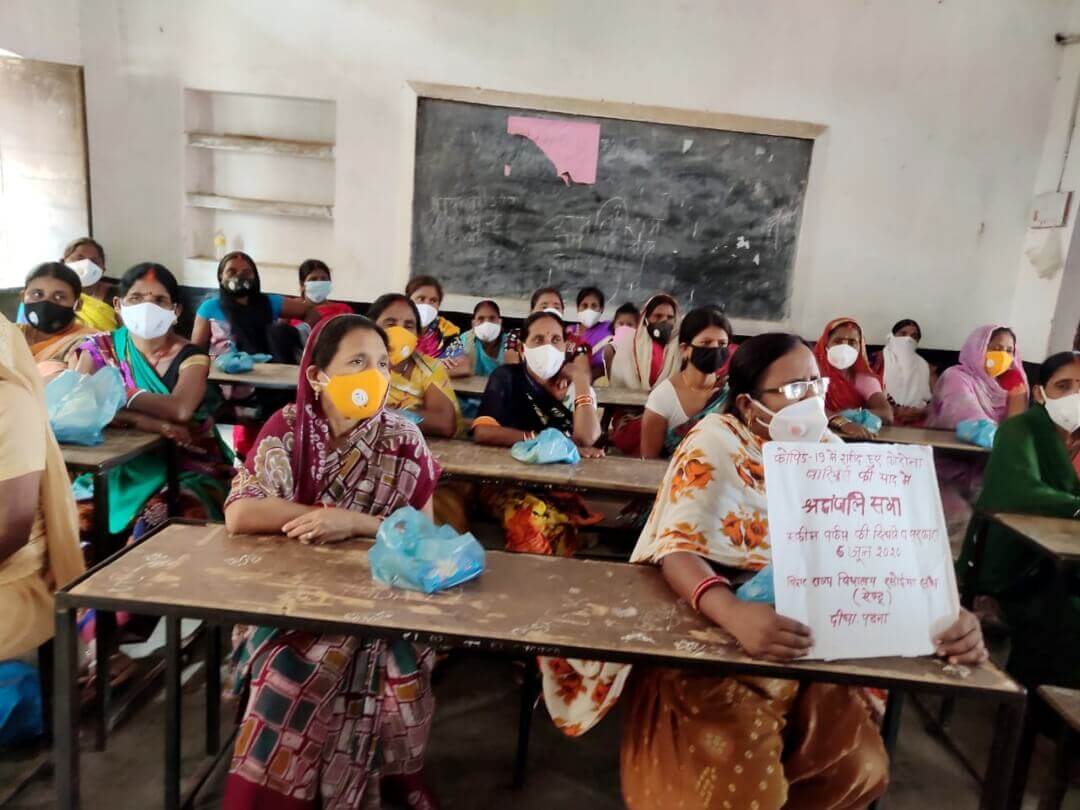Plight of Midday Meal Workers in Bihar under Lockdown & Pandemic

DURING this time of Covid-19 pandemic all government schools have been closed but the school Rasoiyas have been given the responsibility of preparing meals for the migrant workers in quarantine centers. Initially there were only a few workers but as the Lockdown progressed and Shramik trains were run, the numbers increased. The burden on the Rasoiyas also started increasing. They had to go to the school at 6 AM and could return only at 9 or 10 PM.
Meanwhile, Rasoiyas had to face many kinds of difficulties. First, the government has not made proper safety arrangements for them like masks, sanitizers and soap. The Rasoiyas had to arrange these on their own. Secondly, as arrangements for sufficient drinking water are not available in schools, Rasoiyas and migrant workers had to drink water from the same hand-pump, thus making them vulnerable to infection and causing the villagers to say that the Rasoiyas should not live in the village but in the quarantine centers. Some Rsoiyas were even beaten up in Pakdidayal Block in Western Champaran. An FIR has been registered in this matter.
Thirdly, having to work from 6 AM to 9 PM is too much of a burden on the Rasoiyas. At some places Rasoiyas even had to work double shifts; at other places a single Rasoiya had to work from start to finish. Such harsh conditions of work led to the death of 2 Rasoiyas—Sakli Devi in Eastern Champaran and Umesh Mahto in Samastipur.
The Bihar Rajya Vidyalaya Rasoiya Sangh Easter Champaran unit enquired into the incident of beating up of Rasoiyas and held a District level protest on 27 May 2020. Another District level protest was held and a memorandum submitted on 29 May after the death of Sakli Devi. A team enquired into the death of Umesh Mahto, collected contributions from the people for the funeral and protested against administrative negligence. During all this, the attitude of the administration was extremely insensitive. Till date they have not rendered any help to the Rasoiyas.
Rasoiyas working in the quarantine centers were not paid minimum wages. Only in Darbhanga and Muzaffarpur they were paid daily wages of Rs 287 and Rs 299 respectively. At other places they have not yet been paid, whereas Rasoiyas working on a private basis have been paid. In Eastern Champaran they have been told that they will be paid at the rate of Rs 100 per day. At Vaishali they have been told that 4 Rasoiyas together will be paid Rs 125. Protests from home were organized against this deliberate and atrocious attitude and memorandums submitted.
Seeing the insensitivity of the government, ‘Talash’ Editor Dr Meera Dutta has contributed Rs 20,000 to each of the families of the 2 deceased Rasoiyas. She also distributed masks and soap to Rasoiyas at Patna City (5 June) and Digha (6 June). She spoke with Rasoiyas on the current situation and on the topic ‘Condition of Scheme Workers and the Government’. Tributes were paid to all Corona warriors who lost their lives due to Covid-19. CPIML, AIPWA and Rasoiya Sangh leaders along with 50 Rasoiyas each at Patna City and Digha participated in the programs.
Addressing both these programs, Rasoiya Sangh General Secretary Saroj Chaube said that Rasoiyas are made to work like government servants but are not given the status of government employees and now they are being exploited by increasing working hours. The struggle against this exploitation needs to be intensified. Dr Meera Dutta said that the government is now busy with election preparations while saying that people must learn to live with Corona virus; therefore, Rasoiyas have been left by the government to look after themselves. AIPWA leader Anita Sinha said that we must strengthen our organization and make the countrywide worker unions’ protest called on 3 July a resounding success.
- Saroj Chaube
Charu Bhawan, U-90, Shakarpur, Delhi 110092
Phone: +91-11-42785864 | +91 9717274961 E-mail: info@cpiml.org

